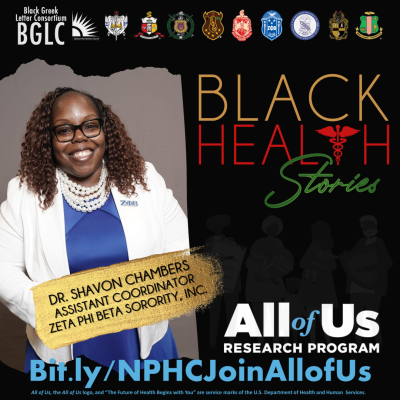Written by Dr. Shavon Chambers, Zeta Phi Beta Assistant Coordinator
At the onset of the COVID-19 pandemic, I remember checking off asthma as the only pre-existing condition that I had in order to determine how to stay as healthy as possible. As the months turned into a full year, I was grateful that despite working as a school administrator I did not contract COVID-19. Even though I didn’t contract the virus, I began to experience constant pain in my neck and throughout my lower back. There were days when my legs felt like needles were running through them and my hands were painful to use while simply typing or texting. For the first few doctor visits, we cited sitting at a desk for virtual learning and meetings as the culprit. However, after five months of physical therapy twice a week and finishing a 90-pill supply of 800 mg of ibuprofen, I knew something more had to be wrong.
Over the next 12 months I began a tedious process of visiting spine and pain doctors and rheumatologists/autoimmune specialists. I increased my mental health therapy sessions as I struggled to cope with the chronic pain and countless visits. The first rheumatologist that I visited cited my weight as the issue for my pain, despite having lost 11 pounds in that same year, and ruled out the idea of anything autoimmune related. During this difficult time, I remembered the testimonies shared by participants at the 2021 spring BGLC Minority Student Research Symposium, which highlighted the importance of knowing your family history as a key to your own health and overall lifestyle. It was this event that led me to think about my own family history and how many women on my mother’s side complained of various aches and body pains as they grew older. A subsequent conversation with my mother provided a startling discovery — both her and two of her sisters had been diagnosed with rheumatoid arthritis in the past two years. I left this conversation with a sense of hope that maybe there was a chance of discovering what was happening internally to cause this chronic pain.
Upon my return to my primary care doctor that summer, she agreed that we needed to revisit all possibilities related to autoimmune illnesses, as my blood work showed a steady increase of inflammation and a decreasing iron level. Together, we found a new rheumatologist who listened to my family history and ordered a variety of new and repeat tests. While I spent another eight months undergoing tests, and physical therapy, taking new medications, and visiting specialists, my doctors remained committed to getting to the root cause of the pain. All of my tests ruled out lupus and rheumatoid arthritis but the final diagnosis was one that my primary doctor had suspected back in December of 2020. Fibromyalgia, a disorder characterized by widespread musculoskeletal pain that shares many similarities with rheumatoid arthritis, has been identified after 18 months of not knowing the source of my chronic pain. My personal story of navigating a chronic illness remains a key reason why programs such as the All of Us Research Program are needed to give other individuals a fair chance of maintaining a healthy lifestyle no matter their circumstance.

